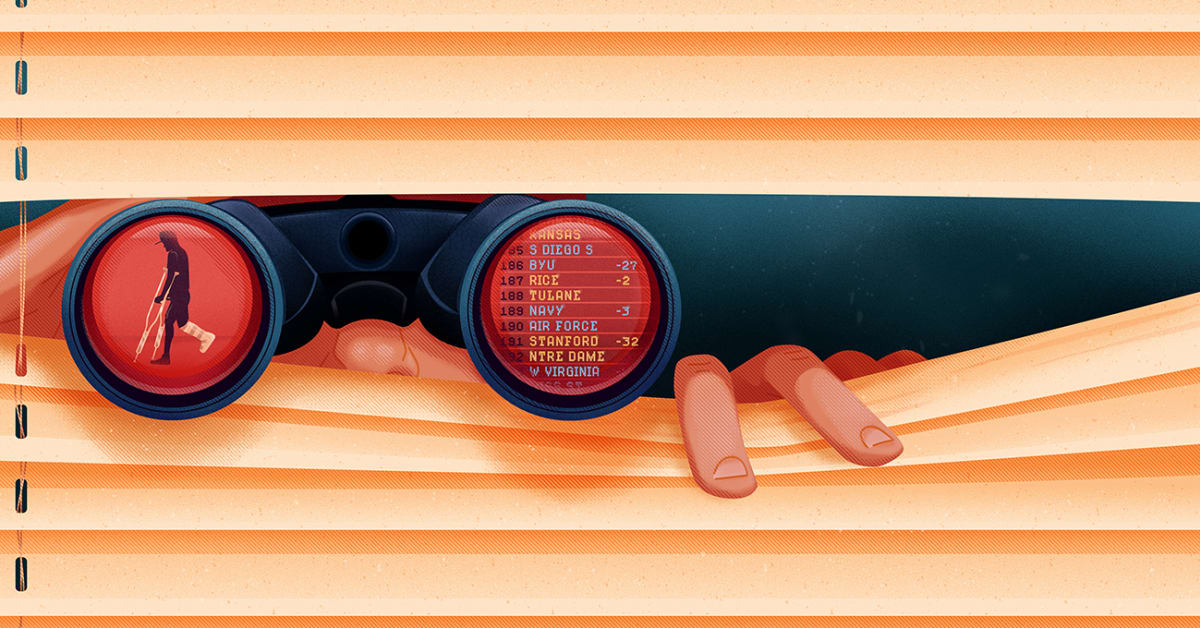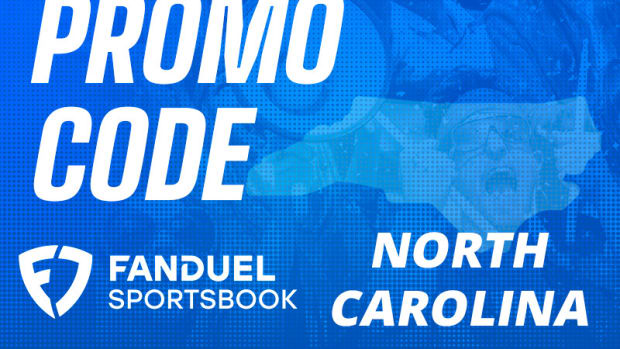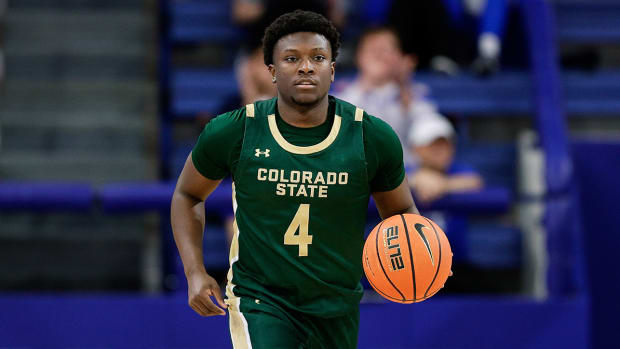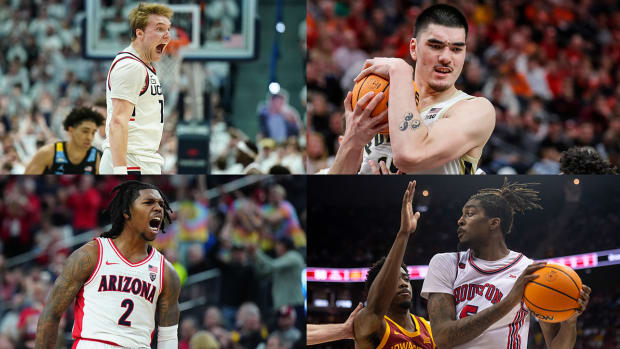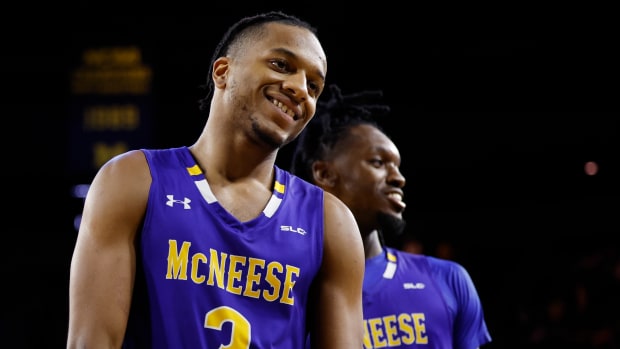Sports World Banks on These Guys to Uncover Betting Scandals
This story is part of Sports Illustrated’s exploration of the ways sports and finance intertwine—from the NIL revolution to online betting, business-minded athletes and more. For more on sports and money, see SI’s October 2023 Money Issue.
As if the inherent home court/field advantage weren’t enough of a factor . . . when a visiting college team is late arriving to a venue—say, missing a pregame shootaround—it’s not just a huge inconvenience. It’s a huge indication of the outcome.
Over the past two years in college football and basketball, a team that is late arriving to a game is 0–13 against both the first-half and full-game spread. While this might be a fun fact for the average sports fan, it is valuable information, potential gold, for the sports bettor.
Last February the Missouri men’s basketball team traveled to Mississippi State. The Tigers were 17–5 at the time. Aboard the team plane, the traveling party learned that mechanical difficulties would delay the trip. While the news elicited groans from the back of the cabin, it also triggered action.
Half a country away, Matt Holt and his team in Henderson, Nev., received a tip-off call from a sports gambling fund. Holt is CEO of U.S. Integrity, a self-described “game integrity, fraud prevention, sports betting, compliance firm.” Subsidized by dozens of clients ranging from leagues to college conferences to individual teams, U.S. Integrity monitors irregularities in the sports betting market.
The group contacted Holt and reported an unusual amount of money suddenly coming in on the underdog Bulldogs. Holt called the SEC. The conference called the schools. Missouri confirmed that there had been a mechanical issue. “But the [athletic director] was confused,” recalls Holt. “He said, ‘The pilot just made the announcement six minutes ago.’ ”
Holt speculates that someone on the flight or in the control tower acted on the information. The Bulldogs beat the first-half spread and then won the game, 63–52. While authorities determined that voiding bets wasn’t warranted, for Holt, it confirmed just how quickly information spreads. And how resourceful bettors can be.
In 2018, the Supreme Court effectively overturned the Professional and Amateur Sports Protection Act, opening the door for states to legalize sports wagering. After the landmark decision, attention turned to enforcement and monitoring.
But efforts to oversee activity at the federal level—including a bipartisan Senate bill backed by Charles Schumer and Orrin Hatch that would have created a national monitor—have failed, in part due to the state-by-state balkanization of sports wagering. Of the 38 states that permit it, each has its own permutations: Age requirements vary, as do the legality of mobile betting and wagering on college.
Instead, monitoring has ended up in the private sector, which comes with its own set of problems. Some companies, for instance, monitor betting activity on behalf of leagues, while at the same time selling data to bookmakers to help set lines. As such, they are self-policing perhaps for the public good, but also to protect their own business interests. “Betting line integrity monitoring is certainly an important aspect of a legal regulated sports betting ecosystem,” says Ryan Rodenberg, a professor in the department of sport management at Florida State who specializes in sports gambling. “However, those doing the monitoring are largely private entities that are beholden to their corporate partners.”
U.S. Integrity, however, is independent. Though it is a private, for-profit business, it doesn’t traffic in data, doesn’t take bets and doesn’t sell risk-management services. Its revenue comes from sports and gambling clients buying what Holt calls “a front-end alerting system,” basically a first line of defense against corruption. Clients include the NBA, MLB, PGA Tour, SEC, Big 12 and major sportsbooks.
In an office awash in monitors, Holt and his team of 26 employees track betting data and odds in real time. Sometimes the system identifies abnormal or suspicious activity—a sudden jump in a line or counterintuitive bets. Sometimes a tip will come anonymously from a sportsbook or social media. Then the suspicious activity is flagged by an analyst. Holt says this tends to happen three or four times a week.
The analysts quickly investigate further, pulling more data or contacting the sportsbook directly. In about half the cases, the suspicion is doused by a plausible explanation. In the other half, the investigation rises to an “alert” level, at which point U.S. Integrity notifies state regulators and local operators. Regulators must typically respond within hours to basic questions: Did you accept wagering on this event? Did you see similar activity? Those forms are sent to investigative bodies (sometimes including the FBI). In most cases operators stop taking bets. If the game has started, payouts may be suspended.
Consider a ticktock from April.
A bettor later identified as Bert Neff of Indianapolis approached the window of the BetMGM Sportsbook in Cincinnati’s Great American Ball Park. There, Neff reportedly attempted to bet more than $100,000 on LSU to beat Alabama in a baseball game that night, according to sources familiar with the wager. Why would someone in Ohio place that big a bet on an SEC game in a low-volume betting sport, a matchup that had yet to attract a single wager on FanDuel?
The book contacted U.S. Integrity, which, in minutes, confirmed the irregular activity. U.S. Integrity then issued an alert regarding “suspicious wagering activity” on the game. The Ohio Casino Control Commission promptly instructed the state’s licensed sportsbooks to take Bama-LSU off the board. Other states and national books followed.
Within hours, a deeper investigation commenced. Security footage had captured Neff, as he made the bet, texting with Alabama baseball coach Brad Bohannon. (Having scratched their starting pitcher with back tightness, the Tide lost the game, 8–6.) Within a week, Alabama fired Bohannon. (Efforts by Sports Illustrated to reach Bohannon and Neff have been unsuccessful.)
This was the equivalent of a lazy pop-up or a gimme putt. It is not often a suspicious bettor brings his phone into a sportsbook showing his real-time communication with one of the coaches of the game in question. Most investigations are more sophisticated. So are most circumstances that trigger alerts.

Alabama fired baseball coach Brad Bohannon after the Ohio gambling incident.
Gary Cosby Jr. / USA TODAY NETWORK
“We need to work with . . . the operators to get this information,” Holt says. “Guys that usually bet $50 a game on baseball, now they want to bet $20,000 on the first set in a tennis match? Whoa. Or a betting account has been dormant, and now a guy wants to deposit $25,000 and bet it all on an esports match?”
When the floodgates for sports betting burst open five years ago, there was much hand-wringing about the potential for corruption by athletes. There have been a handful of these instances. Allegations of match-fixing still dog low-level tennis. After he allegedly bet on league games and made prop bets involving teammates, Colts cornerback Isaiah Rodgers Sr. was suspended by the NFL, and Indy subsequently waived him. Other NFL players have been suspended for placing bets on team property, often caught by integrity monitors and state agencies via geolocations. Still other times athletes innocently reveal information, such as injury reports, that is then used by others within earshot less than innocently.
But overall, there is scant evidence that athletes are undermining competition or consorting with dark forces. Rodenberg suggests that salaries in professional sports are such that, leaving morals aside, athletes would be acting irrationally if they were to risk their jobs to make a few extra bucks. (He adds that, at the college level, NIL functions similarly, providing athletes with income as well as incentive to avoid reputational damage.)
The majority of incidents involving suspicious betting and corrupt behavior have come from those who are “athlete-adjacent”—referees, umpires, officials, figures possessing insider information or the ability to influence results.
“Two things that would keep me up at night: number one, the sports that use subjective scorekeepers for things like tracking rebounds and assists,” Rodenberg says. “[They] hold immense power, with all the prop bets out there. Then, second, the athletic training intern who might barely know how to tape an ankle but is privy to all this information about injuries. They possess valuable information that can be sold as a commodity.”
Earlier this year, a Reddit poster noted curious decisions made by the Grizzlies’ official scorer, particularly with respect to Jaren Jackson Jr.’s generous defensive stats. As speculation mounted, Caesars took its Defensive Player of the Year betting options off the books. While an investigation eventually vindicated the scorer, the incident laid bare the vulnerability of one person making subjective decisions.
Despite his high-profile wins, Holt is doing no victory laps. “My fear is that we’re only catching the easy ones,” he says. “And there’s been a lot of easy ones lately. But I don’t think we’re catching as many sophisticated ones as we should.”
What would improve detection? “Regulations aren’t as consistent across the board,” he says. “If we had every state with the same guidelines, every book has to share data in real time. . . . Then suddenly we’re able to, in real time, identify more.”
Which returns us to Schumer and Hatch’s failed uniform federal law and its government-run monitor. As with many questions of public vs. private, Holt argues the advantage of a private company comes with innovation and the ability to keep up with trends. “Private companies build better technology faster than government agencies,” he says.
Rodenberg does not disagree but says there are trade-offs: “I have no doubt that private operators have better data sets and better technology and, frankly, probably better statistical acumen to detect this kind of stuff. But they also have a partnership and a contractual obligation to report those things to their customers as opposed to the FBI and state regulators.”
In other words, even a group like U.S. Integrity—which keeps its nose clean from odds-making—eventually has its bread buttered by the industry. In the absence of any other neutral monitor, all fans can do is hope that Holt’s agency lives up to its name.
































